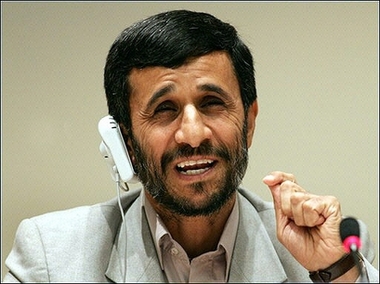TEHRAN, Iran - Iran's hard-line president on Thursday again rejected demands
that Tehran suspend uranium enrichment, even as top Iranian and European
diplomats sounded somewhat optimistic about making progress toward starting
negotiations.

Iran's President Mahmoud Ahmadinejad,
seen here on September 21, vowed that Iran would not yield on its nuclear
program. "The Iranian nation will not bend one inch against any
(international) force and pressure," he told supporters in a speech in the
city of Karaj just outside Tehran broadcast on state television.
[AFP] |
Iranian and European envoys ended two days of talks in Berlin with no
agreement on the enrichment issue but insisted they had "come to some positive
conclusions" on ways to open broader talks on Iran's nuclear program.
Iranian President Mahmoud Ahmadinejad stood firm on his insistence that Iran
has a right to pursue its atomic program and showed no sign of compromise over
the U.N. Security Council's demand that his government suspend enrichment.
The statements from the negotiators and the Iranian president continue a
pattern of past months, in which Ahmadinejad publicly states a hard-line
position of no compromise, often in front of large crowds, even as Iran's
negotiators try to reach deals behind the scenes.
The Iranians appear to be gambling that even the hint of progress will blunt
any push for U.N. sanctions.
Ahmadinejad said the United States and its European allies want Iran to
suspend enrichment as a first step toward forcing a permanent halt in the
nuclear program, because they are opposed to Tehran's progress.
The U.S. and others fear Iran's goal for developing enrichment technology is
to produce material for atomic bombs, while oil-rich Iran says it needs
enrichment to provide fuel for nuclear reactors that will generate electricity
for this developing nation.
Ahmadinejad said Iran would not give in.
"They asked for a one-day halt. We said we won't do it," he told thousands
gathered in Karaj, west of Tehran.
Iranian state TV quoted Ahmadinejad on Wednesday as saying Western
negotiators were trying to persuade Iran to halt enrichment for just a day, to
create a face-saving way for opening negotiations. President Bush has refused to
enter into talks until Tehran halts enrichment.
"Those who have filled their arsenal with nuclear weapons and conduct new
tests every day want, on political pretexts, to deny the Iranian nation its full
definite right of using nuclear energy for peaceful purposes," Ahmadinejad said.
"The Iranian nation won't give into one iota of coercion."
The U.S. House sought to step up pressure Thursday by adopting legislation
that would impose U.S. sanctions on any entity found to help Iran develop atomic
weapons. The bill has yet to go before the Senate, and critics questioned the
need for such action when the U.S. is pushing for a multinational approach.
Iran ignored a U.N. Security Council deadline of Aug. 31 to halt enrichment
or face the possibility of economic sanctions.
Despite that threat, Russia and China oppose any immediate move to impose
punitive measures, and as permanent council members can veto its actions. Both
nations, which have trade ties with Iran, argue that diplomacy hasn't been
exhausted.
Six countries ¡ª the United States, China, Russia, France, Britain and Germany
¡ª have offered a package of incentives in return for Iran suspending enrichment
and returning to full-scale negotiations aimed at putting curbs on the nuclear
program that would ease suspicions.
Ahmadinejad said the Europeans asked for a three-month suspension of
enrichment, which he said would mean "a huge loss" for the Iranian program.
"Who will pay for the losses?" he asked. "Then they reached a point that they
asked for a one-day halt. We said we won't do it."
In Berlin, Javier Solana, the European Union foreign policy chief, refused to
give details of the third session of talks but said he would confer by telephone
with the Iranians next week. "We want to maintain the level of contact that we
have had," Solana said.
Iran's chief nuclear negotiator, Ali Larijani, said the two sides discussed
ways that full-scale talks could proceed, adding that Tehran hoped "to embark on
the main negotiations as soon as possible."